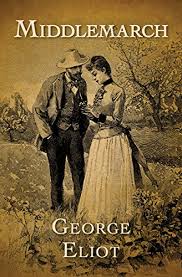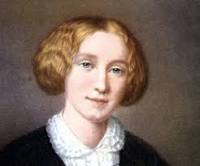Middlemarch Page #22
Middlemarch, A Study of Provincial Life is a novel by the English author George Eliot, appearing in eight instalments in 1871 and 1872. Set in a fictitious Midlands town from 1829 to 1832, it follows distinct, intersecting stories with many characters.
Dorothea walked about the house with delightful emotion. Everything seemed hallowed to her: this was to be the home of her wifehood, and she looked up with eyes full of confidence to Mr. Casaubon when he drew her attention specially to some actual arrangement and asked her if she would like an alteration. All appeals to her taste she met gratefully, but saw nothing to alter. His efforts at exact courtesy and formal tenderness had no defect for her. She filled up all blanks with unmanifested perfections, interpreting him as she interpreted the works of Providence, and accounting for seeming discords by her own deafness to the higher harmonies. And there are many blanks left in the weeks of courtship which a loving faith fills with happy assurance. “Now, my dear Dorothea, I wish you to favor me by pointing out which room you would like to have as your boudoir,” said Mr. Casaubon, showing that his views of the womanly nature were sufficiently large to include that requirement. “It is very kind of you to think of that,” said Dorothea, “but I assure you I would rather have all those matters decided for me. I shall be much happier to take everything as it is—just as you have been used to have it, or as you will yourself choose it to be. I have no motive for wishing anything else.” “Oh, Dodo,” said Celia, “will you not have the bow-windowed room up-stairs?” Mr. Casaubon led the way thither. The bow-window looked down the avenue of limes; the furniture was all of a faded blue, and there were miniatures of ladies and gentlemen with powdered hair hanging in a group. A piece of tapestry over a door also showed a blue-green world with a pale stag in it. The chairs and tables were thin-legged and easy to upset. It was a room where one might fancy the ghost of a tight-laced lady revisiting the scene of her embroidery. A light bookcase contained duodecimo volumes of polite literature in calf, completing the furniture. “Yes,” said Mr. Brooke, “this would be a pretty room with some new hangings, sofas, and that sort of thing. A little bare now.” “No, uncle,” said Dorothea, eagerly. “Pray do not speak of altering anything. There are so many other things in the world that want altering—I like to take these things as they are. And you like them as they are, don’t you?” she added, looking at Mr. Casaubon. “Perhaps this was your mother’s room when she was young.” “It was,” he said, with his slow bend of the head. “This is your mother,” said Dorothea, who had turned to examine the group of miniatures. “It is like the tiny one you brought me; only, I should think, a better portrait. And this one opposite, who is this?” “Her elder sister. They were, like you and your sister, the only two children of their parents, who hang above them, you see.” “The sister is pretty,” said Celia, implying that she thought less favorably of Mr. Casaubon’s mother. It was a new opening to Celia’s imagination, that he came of a family who had all been young in their time—the ladies wearing necklaces. “It is a peculiar face,” said Dorothea, looking closely. “Those deep gray eyes rather near together—and the delicate irregular nose with a sort of ripple in it—and all the powdered curls hanging backward. Altogether it seems to me peculiar rather than pretty. There is not even a family likeness between her and your mother.” “No. And they were not alike in their lot.” “You did not mention her to me,” said Dorothea. “My aunt made an unfortunate marriage. I never saw her.” Dorothea wondered a little, but felt that it would be indelicate just then to ask for any information which Mr. Casaubon did not proffer, and she turned to the window to admire the view. The sun had lately pierced the gray, and the avenue of limes cast shadows. “Shall we not walk in the garden now?” said Dorothea. “And you would like to see the church, you know,” said Mr. Brooke. “It is a droll little church. And the village. It all lies in a nut-shell. By the way, it will suit you, Dorothea; for the cottages are like a row of alms-houses—little gardens, gilly-flowers, that sort of thing.” “Yes, please,” said Dorothea, looking at Mr. Casaubon, “I should like to see all that.” She had got nothing from him more graphic about the Lowick cottages than that they were “not bad.” They were soon on a gravel walk which led chiefly between grassy borders and clumps of trees, this being the nearest way to the church, Mr. Casaubon said. At the little gate leading into the churchyard there was a pause while Mr. Casaubon went to the parsonage close by to fetch a key. Celia, who had been hanging a little in the rear, came up presently, when she saw that Mr. Casaubon was gone away, and said in her easy staccato, which always seemed to contradict the suspicion of any malicious intent— “Do you know, Dorothea, I saw some one quite young coming up one of the walks.” “Is that astonishing, Celia?” “There may be a young gardener, you know—why not?” said Mr. Brooke. “I told Casaubon he should change his gardener.” “No, not a gardener,” said Celia; “a gentleman with a sketch-book. He had light-brown curls. I only saw his back. But he was quite young.” “The curate’s son, perhaps,” said Mr. Brooke. “Ah, there is Casaubon again, and Tucker with him. He is going to introduce Tucker. You don’t know Tucker yet.” Mr. Tucker was the middle-aged curate, one of the “inferior clergy,” who are usually not wanting in sons. But after the introduction, the conversation did not lead to any question about his family, and the startling apparition of youthfulness was forgotten by every one but Celia. She inwardly declined to believe that the light-brown curls and slim figure could have any relationship to Mr. Tucker, who was just as old and musty-looking as she would have expected Mr. Casaubon’s curate to be; doubtless an excellent man who would go to heaven (for Celia wished not to be unprincipled), but the corners of his mouth were so unpleasant. Celia thought with some dismalness of the time she should have to spend as bridesmaid at Lowick, while the curate had probably no pretty little children whom she could like, irrespective of principle. Mr. Tucker was invaluable in their walk; and perhaps Mr. Casaubon had not been without foresight on this head, the curate being able to answer all Dorothea’s questions about the villagers and the other parishioners. Everybody, he assured her, was well off in Lowick: not a cottager in those double cottages at a low rent but kept a pig, and the strips of garden at the back were well tended. The small boys wore excellent corduroy, the girls went out as tidy servants, or did a little straw-plaiting at home: no looms here, no Dissent; and though the public disposition was rather towards laying by money than towards spirituality, there was not much vice. The speckled fowls were so numerous that Mr. Brooke observed, “Your farmers leave some barley for the women to glean, I see. The poor folks here might have a fowl in their pot, as the good French king used to wish for all his people. The French eat a good many fowls—skinny fowls, you know.”
Translation
Translate and read this book in other languages:
Select another language:
- - Select -
- 简体中文 (Chinese - Simplified)
- 繁體中文 (Chinese - Traditional)
- Español (Spanish)
- Esperanto (Esperanto)
- 日本語 (Japanese)
- Português (Portuguese)
- Deutsch (German)
- العربية (Arabic)
- Français (French)
- Русский (Russian)
- ಕನ್ನಡ (Kannada)
- 한국어 (Korean)
- עברית (Hebrew)
- Gaeilge (Irish)
- Українська (Ukrainian)
- اردو (Urdu)
- Magyar (Hungarian)
- मानक हिन्दी (Hindi)
- Indonesia (Indonesian)
- Italiano (Italian)
- தமிழ் (Tamil)
- Türkçe (Turkish)
- తెలుగు (Telugu)
- ภาษาไทย (Thai)
- Tiếng Việt (Vietnamese)
- Čeština (Czech)
- Polski (Polish)
- Bahasa Indonesia (Indonesian)
- Românește (Romanian)
- Nederlands (Dutch)
- Ελληνικά (Greek)
- Latinum (Latin)
- Svenska (Swedish)
- Dansk (Danish)
- Suomi (Finnish)
- فارسی (Persian)
- ייִדיש (Yiddish)
- հայերեն (Armenian)
- Norsk (Norwegian)
- English (English)
Citation
Use the citation below to add this book to your bibliography:
Style:MLAChicagoAPA
"Middlemarch Books." Literature.com. STANDS4 LLC, 2024. Web. 25 Nov. 2024. <https://www.literature.com/book/middlemarch_242>.




Discuss this Middlemarch book with the community:
Report Comment
We're doing our best to make sure our content is useful, accurate and safe.
If by any chance you spot an inappropriate comment while navigating through our website please use this form to let us know, and we'll take care of it shortly.
Attachment
You need to be logged in to favorite.
Log In